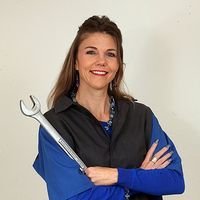Leaderboard
Popular Content
Showing content with the highest reputation since 01/25/2010 in Blog Comments
-
Treat your employees like human beings. Walk around the shop and touch base occasionally. Do no talk about the job or work. Take an employee out to lunch. Let them steer the conversation and don't talk about the job unless they bring it up. Don't be afraid to do little things like get water ice on hot summer days. Oh. Treat your employees like human beings.4 points
-
Independent repair shops don't have the luxury of having multiple profit centers subsidize shop overhead that new car dealers do. Here are just 4 other profit streams that have nothing to do with repair or maintenance: New car sales Used car sales Paint & Body shop Detailing To me, it's simply bad business to be cheaper than the dealer. We had 13 car dealerships about a mile away from our shop. Southtowne Auto Mall We were either the same price, or higher for transmission repair, but we gave a longer warranty which added value. If we were less than the dealer, we could never remain profitable. I think about it this way: We weren't higher than the dealer; but instead, the dealer was cheaper than us for the reasons above. We ended up towing a lot of vehicles out of the dealerships along with customers dropping the vehicle off for repair. The numerous new car dealerships near us were the source of a lot of the work we did. Don't be afraid of dealerships; embrace them because they are a great source of new jobs coming into the shop. Lastly, here's the Southtowne Auto Mall's "claim to fame" they would advertise...3 points
-
Joe, I appreciate the fact that you are not just looking at the Labor Rate but also the operation as a whole. I believe we are all trying to reach a desired net profit, and how we get there involves hundreds of touchpoints. I would say that raising your labor rate is not the solution to low (or no) profitability; raising that rate is only part of the equation. Over the past few years, I have seen a dangerous level of arrogance creeping into our industry, a genuine threat. To achieve the actual profit we want/deserve, we must think like a CEO of a complex business. We must measure metrics throughout the process, looking for areas to cut costs and improve efficiencies. We must also listen to all recorded phone calls and perfect our technique rather than only adding more fuel. Here's a good analogy: How would a NASCAR team fare if, to win the Cup, they were hell-bent on more horsepower as the solution rather than suspension improvements, better aerodynamics, and improved traction? I know NASCAR governs everything, so my example is terrible, but we all get the point. Don't we?3 points
-
Well said! We raised our labor rate by $20 this year to $170. May not be high enough still. But my main issue that we're working to solve are the large leaks in the dam. We're correcting the labor guide to more closely reflect actual times or building contingencies into our estimate to allow for us to request more labor when needed. When communicated correctly it works. Then we are rounding up the labor. Labor guide is close sometimes and has errors or is misleading at other times. In a class today, we discussed bumping the actual labor time by 20-30%. Then he said to add 10% to the total and give everyone a loaner car or Uber. Being afraid to charge properly all the time was an expensive lesson. We're doing way better now. I feel like we are about 80-90% corrected. Also, need to keep one of my techs from doing unauthorized / unsold work too. When he gets on a roll, stop is not in his vocabulary. We're working on this too. Productivity isn't an issue for us yet as I'm staffed for where I expect to be (which is overstaffed for today). We'll be ready to manage that when it is required. I'm happy that our profitability has grown enough to allow me and my shop foreman to attend the Vision Training Conference in Kansas City. Today was the 1st of 4 days. Both of us had a great 1st day!3 points
-
Joe, when I first started working with my father over 30 years ago, I wanted to hire a guy who was an ex Matco Tool man, he wanted 650 a week plus full paid benefits and 2 weeks a year vacation. My father told me it was too much, but if I thought the guy was good hire him and it was up to me to pull the difference. At the end of the first week my dad told me to give Karl an extra 100 cause he was worth it. Not only did he pull his weight, but he was one of those guys that made everyone in shop better and helped me get better help.2 points
-
that sounds like a "good" experience. I don't see it as amazing. Bad communication makes for a bad experience. I think good communication makes for a good experience, but not amazing.2 points
-
Good post, Joe. I would suggest a follow-up post covering the next step, the phase beyond empathy. What does the shop owner do next, how can they provide aid in various examples while not breaking the membrane between a business leader and team member. I feel many business owners naturally have empathetic responses, but also a healthy fear of "what's next" and for good reason. Mastering the next phase is where Culture is built.2 points
-
That's an interesting approach; I like it. In general repair, we all strive for a 60% GP, which I believe is what you are stating. I have found that P&L statements can be very misleading; the proof lives in the balance sheet and the cash flow statement. I remember when my P&L looked great, but I never had enough cash to pay taxes on April 15th; where did it go? Going back to Joe's point: "The first step in achieving your required gross and net profit is understanding your numbers and establishing the correct labor and part margins. The next step is to find your business's inefficiencies that impact high production levels." Net profit is what we are after; it is what we need in order to grow our business. To have a great business, one that is sustainable, we are constantly refining our process and looking for intelligent opportunities.2 points
-
I find it amazing that nobody specifically mentions a P&L statement. For our shop, we would look at the Profit & Loss statement to not only know our profit margin but to also calculate labor charges and markup on parts. We are a transmission shop that has only 4 numbers to tell us if our labor & parts are priced correctly. For us, it works like this... 20% of sales should be parts, 20% of sales should be labor, and 40% of sales should be overhead, leaving 20% of sales as profit. If any one of those 4 numbers is off, we either need to adjust our pricing, look at the number of warranty claims, or shop efficiency/productivity. Those 4 numbers tell me everything I need to know about our prices and profit margin. To me, it's not as complex as some shop owners make it out to be. If anything is below target, we adjust our prices accordingly, start looking at shop efficiency, or look for underpriced estimates. It's only as hard as 4 numbers and being able to rationally diagnose problems that affect our numbers. Just look at your P&L statement.2 points
-
I sold my company and the land a little over a year ago. Made out good with the sale of two locations and property. However, one of the things I did (on the advice of my financial advisor) was to also fund a retirement plan over the past 25 years. Your question is valid and right on target, but you need advice from a CPA accountant and your financial advisor. For me, while the sale was good, I had to pay capital gains tax, but it wasn't that bad since the property was redeveloped in 2008, and I still had a lot of depreciation that helped reduce my tax liability. Another thing to consider is how your money will be invested. I moved my investments to more slow growth over the years as I got older and added the proceeds from the sale to this portfolio. You don't make large gains in a good market with slower growth investments, but when it turns bad, you don't lose as much. The point is that you need to sit down, do your budget for after you retire, and then determine how much your money will last with different scenarios. A good financial advisor can help with this. Only after that can you determine if the dividends will be enough. Sorry for not giving a direct answer, but I want to be honest from what I have learned.2 points
-
Your spot on Joe! I do think that a new business starting out should do some sort of advertising in the local area, but after that its giving it your best in customer care and service. I do now have a couple of blogs on my websites that keep the Google people happy and attract a younger class of customer, but as you say its service with a smile all the way. Just an addon. The British government did not charge the owners of electric cars with road tax. But now they have done a U turn and this advantage to owning one has now being scrapped! well well the dream of zero emissions by 2030 is already falling apart. Here in the UK at least.2 points
-
Great tips, Joe! I wish I had those tips when I was in business before I retired. The one tip the I, as well as most shop owners struggle with is "Hire the best people and have enough staff." Easier said than done. I hooked up with 3 automotive technical colleges in our region with limited success. They were Automotive Technology | Transportation Technologies | Utah Valley University Automotive Technology I still had to train the students as if they were green off the street. That part didn't bother me. What bothered me was the unrealistic expectations the student had as far as production and salary expectations. The students couldn't grasp what a major investment we were making in training them. They weren't used to working alone and having production expectations put on them. After many years, I went back to hiring out of the industry and paying above normal salaries/hourly pay to attract the best of the best.2 points
-
Yeah, Joe, we had different profit levels on different parts, labors, and whole jobs. What I learned to pay attention to was the overall gross profit of the business. It was very easy for me due to learning accounting through an early SMS I invested in named Digitree out of Colorado. They were eventually bought out by Mitchell and Mitchell quit supporting the repair shop version and only supported the body shop version. Later, I eventually went to a transmission shop-only software program called TransShop 1-2-3 by Larry Kuperman. (now retired) He stole the idea from Lotus 1-2-3. I learned a lot of easy management tricks through DigitTree. At the end of the week report, I would also print (remember dot-matrix printers?) out checks for that week's sales tax and 941 tax. At the end of the month, I would pay my 941 with 4 checks. We paid sales tax quarterly and I would pay that with 12-13 checks. That kept our bank balance from looking overly inflated giving me a false sense of security. Even worse, I wouldn't spend the money on something non-essential. It simply blows me away at the number of small business owners who don't know accounting. Reminds me of a young rebuilder I hired (early 30s) who had been building transmissions for about 10 years. Depending on the year model of a certain transmission, the steel plates and friction plates were of different thicknesses. I told him to measure the old ones to know which ones to use. I then learned he couldn't read a mic. I asked him how he could go so long not being able to read a mic. He said his old boss had a digital read-out mike, dial calipers, and a dial indicator. He had never learned to read a mic the old fashion, but standard, way. That young builder reminded me of small business owners who don't know accounting nor do any in-house accounting. Many have an accountant for all of that and the P&L and balance sheets they get from their accountant are basically an obituary as to their financial picture. They are often a month, a quarter, or heaven forbid, a year old. There are plenty of ways to learn accounting. Online, books, and even YouTube can all teach standard accounting principles and practices. It's not that hard and definitely not rocket science. Even the numbering of groups of accounts is standardized. For our members who don't, I would strongly suggest bringing all accounting in-house and only using an accountant, or CPA like we did, only annually.2 points
-
I agree with that. We used YouTube videos of 2-3 minutes to show people what's up. After I Email or text them the final bid, over half would either text or Email me back the "When" question which opened up for the assumptive sale. I didn't sell that way on small-ticket repairs. I think most people feel the "how much" and "when" questions are all they need to know. In the '90s and early 2000s, we were in a different market area where there was a lot of nitpicking the final estimate/invoice. I can't help but think that a lot of that was attributed to there not being any YouTube around, but also because it was a low income area. Location selection is very important, which I didn't realize until I was in my 50s.2 points
-
About three months ago I did a $25/hour increase. I don't even think about it today. The price is now what it is and I will probably do another increase soon.2 points
-
You are right. If and when you raise prices, make sure you believe in them and the why for. We have found when quoting every single time the cost of a check engine light, if we ourselves believe in it, then the customer knows that and realizes the value.2 points
-
So true @Auto Repair Coach I think many forget that employees often spend more time at work than they do with their family, friends, and at home.2 points
-
Hey Wayne I give my advisors a daily production sheet that they must turn in daily. It includes things like: 1. Follow up phone calls to past FTA's (3 Daily - must make contact) 2. Calling appointment reminders (3 Daily - Must make contact) 3. Calling last weeks customers to say thank you (3 Daily must make contact) 4. Calling customers who have Previous recommendations (3 daily must make contact) what I mean by must make contact is if they call someone and just left a message it does not count, they must actually make contact with the person for it to count. I hope this helps, this is just a few things that I include in there daily production sheet.2 points
-
How our industry is currently paying technicians... https://www.ratchetandwrench.com/running-a-shop/human-resources/article/55038486/numbers-how-auto-repair-shops-pay-technicians1 point
-
If you are on any social media you see the trend today is to move jobs. Watch and listen as they explain why, todays employee feel the only way to advance is to constantly seek out new employment, pit employer against employer and leverage the best deals. They talk constant about how employers do not value the employee, there are sights where employees go to rate the employer and share pay rates. Our trade is no different. We don't provide clear career paths, pay increase, benefits etc. Long gone are the days when employees stayed at one place for their career. They take 401k and head for the door. No easy answer, make your little part of the world the best you can and carry on.1 point
-
A recent article in Ratchet & Wrench magazine said, "Flat rate puts the burden on the employee and hourly puts the burden on the shop." In the transmission business, I agree. I don't know of a shop whose main source of revenue is automatic transmission repair that pays their technicians by the flat rate system although many general repair shops and dealerships do. To me, if the front and back office are doing their jobs properly, including, marketing advertising selling And by treating their customers right by giving them a pleasing experience, there should be plenty of jobs to perform. Sadly, shops like that are in the minority. I only discovered this truth in the last 7 years I was in business because I came from a technical background, not business. In most shops, the technicians fully expect slow times. It wasn't true in our shop once I harnessed the power of the internet. Although we had our first website in 1997, we didn't start using it properly until ten years later when I started spending more of my time in the back office. I came to learn that no matter what the pay plan was, it was the office's responsibility to keep the shop busy and full of work. That bears repeating, it is the office's responsibility to keep the shop busy and full of work. I think the best techs like to stay busy by nature. At least that has been my experience. Techs that were slackers didn't stay around long or if they did, they soon got with the program from peer pressure from the other techs. I don't care what compensation plan a shop offers, if the techs can't pay their bills with some leftover, they won't be around long. Whether what's left over after paying bills goes to savings, entertainment, or whatever, that's their choice. The key phrase I would often use is "a comfortable living." Some techs struggle to buy tools as reported in this article. Conversely, I believe most shops have their techs suffer the burden of ineffective marketing, advertising, and sales that lead to slow times. To me, from a tech's perspective, this isn't right. It's management's equivalent of a recheck or comeback. Why should the tech be penalized for it being slow? This is why we always paid by the hour and it worked well for us. It placed the burden of keeping everyone busy on me, and not penalizing the techs if I didn't keep them busy. Any compensation package is perfect as long as the tech makes "a comfortable living." If you want to know what most technicians think, read this WrenchWay industry survey. My solution for others is to either learn how to use the internet effectively or hire someone who can. That was my solution to the perfect pay plan.1 point
-
This is so true, many will not tell the owner or person in charge of any short fall, but will tell others. I was in a Wendy's eating a lunch one day and watched a Buick pull in and park and an older fellow with his wife get out. They ordered and sat down across from me. Another fellow walked up and said to them, I see you own a Buick. Just in case you ever need body repair do not go to so and so collision shop. They are terrible and say they are Buick experts. Just wanted you to know and he proceeded to leave and get into his Buick and drive away. You have to wonder how poorly he was treated to stop just anyone and vent his frustration. Did he let the so and so shop know? don't know but that always stuck with me that bad treatment and bad work travels to areas you have no idea about as a shop owner. I always asked my customers if they were happy and if there was anything we could do to improve what they experianced. Sometimes we did get a suggestion and we took it to heart.1 point
-
My YouTube channel made most repairs amazing. That's because we had over 2,200 customer videos of their transmission. In each 3-4 minute video I would explain 3 important things, 1. What failed. 2. What we are going to do to fix it. 3. What we are going to do to keep the failure from happening again. I would then follow up with either a text or Email of a .pdf of the final invoice, including tax. If we found anything extra after that, we would just eat it. Part of an amazing experience is not surprises.1 point
-
I define an amazing experience by great communication. The more I communicate with the customer, the better. The mode of communication doesn't matter. It can be through direct fact-to-face communication, a phone call, text, Email, or a video. Keep the customer informed and make sure you understand his needs. People are prone to go with what they know. Make sure you read all of Joe's blog on customer retention.1 point
-
Once again, you're right. We received about 20% of our business from referrals. We received multiple comments on our website and YouTube channel because they were full of good information. I had a customer that actually wanted to watch his transmission getting rebuilt. He sent us multiple referrals. Below is a local investigative reporter, Bill Gephart, who works for a one of the local TV stations. (3:04) https://youtu.be/Loo6V7Nln-o1 point
-
Very good read. Always stand by your employee's, we all have ups and downs and will always be there for them 110%.1 point
-
1 point
-
I have in the past been a service advisor for a very large Cadillac dealer and I was one of 5 advisors. We all got paid the same, a flat weekly salary and then the commission. The weekly pay was barely enough to say we got a check every week, back then it was $300 per week. Maybe at that time is was good but seemed low. Commissions were paid the second week check of the month for the previous month. As I recall it was 1% for the first $10,000 is parts and labor, not including any warranty sales, 2% for the next $10,000, 3% for the next $5,000 and 4% for the next $5,000 and 5% there after for the months sales. Way back then we were each writting anywhere from $45 to 60 grand a month is sales, again not inclulding warranty or sales taxes on the repair orders. Then there was "spiffs" added if a sale incorporated any of the few items on the list that month, tire rotation & balance, transmission flush, detail cleaning and waxing. That kind of extras. It was a flat $$ figure per sale added to the commission check. Owner was very concerened we didn't sell things that were not nor even needed. No funny business to add to your checks. This was back in 1975 or so, a long time ago, but all of us advisors were pleased at that time with our incomes. Times have changed and I'm sure pay has changed upward a lot.1 point
-
A while back, I posted a letter I wrote to a bad apple we once had. About 3 weeks after giving him the letter, I had to let him go because I saw no improvement. One of the best things I ever did.1 point
-
I might also add, to attract the best; sometimes we need to clean house. When I consider my past, I can remember several periods where I had a talented technician, maybe even a leader, who was just toxic. You know the type, the one with all the wrong body language while you hold your morning huddle? Out of weakness, I allowed those rotten apples to hang on the branch way too long; after all, they were producing hours, right? A-players only work for A-players. When we allow Buzzards within our flock, we will never be able to soar with Eagles. Sorry about all the idioms 😎1 point
-
Here's a good example of a shop owner biting their tongue. The most exasperated I ever got with an employee was when my tech forgot he was driving a stick shift into one of our bays. "How can somebody forget that?" you may ask. The really bad part was the customer was about to go to a family reunion and this was the only vehicle they had access to with a 5th wheel setup in the bed of the truck. Assuming it was an automatic transmission vehicle, my tech merely depressed the brake to stop forward movement. This was a 3/4-ton Dodge Ram diesel...not a chance. The clutch tore right through the brake holding power and kept going forward. It was only after the vehicle almost knocked another car off the lift did the tech think, "Oh, shit, this isn't an automatic" and depressed the clutch pedal. Heck of a time to suddenly realize you have a clutch pedal. They say a picture is worth a thousand words... here's a video worth a million words. The customer missed the family reunion and goes, "I don't like hanging around those people anyway." https://youtu.be/uavCR9f5QME1 point
-
Charlie, Yes we get the point! Great photo. You make great points about the current state of business. And as someone who has been in this industry since 1974, I can tell you that your words have never been more true. The "arrogance" you speak is the prime reason for writing this blog. Perhaps, shop owners should ask themselves, "Is my recent success directly related to what I did, or is it the benefit of current circumstances?" Thank you for you post!1 point
-
1. Is EVERYTHING written up at the initial drop off, to limit waiting for additional approvals? Such as, are you adding a line for brake rotors for approval, just in case it’s more than just pads? "If it turns out to be THIS, can I get your approval now?" 2. Is everything in writing for the technician, every time, versus a, “Hey, that car gets a …” 3. Is the technician cleaning his bay versus the lot guy, whose not producing hours? 4. Has the service advisor created a great relationship with the customer to get most things approved?1 point
-
Great article, Joe. The biggest problem I see in lack of productivity is improperly written estimates. Transmission estimates are very difficult to write. The main reason for that is a lot of transmission shop owners and managers try to quote a price with the transmission still in the car/truck. That's a guessing game at best. Before we give an estimate we do a Removal, Disassembly and Inspection (RDI) on every transmission we gave an estimate for. The fee we charged for that was $477 which we would waive if the customer approved the estimate. We prided our estimates as being written stone. (see below) With the rising prices do the inflation it's sometimes difficult for shop owners and/or managers to ask a PROFITABLE price. It sometimes it just simply takes courage. That's what it takes for sufficient productivity/profit. Under-bidding a job is the fastest way to lose productivity, and eventually, profitability. Most shops I know don't have a problem with tools, shop layout, or a productive workflow. I know my shop didn't. My crew started referring to me as "a tool junkie". Most good shops are that way. We did sometimes have one or 2 comebacks, but that tended to happen in waves. A labor guide is just that, a guide, and many times just flat-out wrong.1 point
-
I think what you plan to do as being an excellent idea, Juli. Take a lesson from my experience... First, make sure the people you sell your business to doesn't go out of business. That happened to us. Secondly, have an early pay off penalty clause for the real estate. The guy we sold the shop real estate to (different from who we sold the business to) paid off the mortgage totally off only 9 months in. We ended up paying $400K to the IRS. And... our $9,100/mo. payments for 30 years simply evaporated. Our retirement plans went out with the shitter. However, overall we came out OK even with the challenges. Like you, our home and new car are paid for and we have no debt. We'll make due with what we have to work with. Don't let my mistakes happen to you!!!1 point
-
All great tips I never had until I met my wife, an accountant, as I've said before. Prior to that, my bookkeeping and accounting was lame at best. I just sort of "winged it." Not a good business practice. I was also guilty of skimming cash and underreporting income. I did everything worse than wrong, what I was doing was illegal to say the least. I was lucky and never had my personal income tax or sales tax returns audited. I was the type of tax payer the Biden administration IRS would be looking for today. From 2006-on, I was above board and I was a legal eagle. Women, by nature, are security-seeking and she is above-board in all her dealings. My wife used another lesser-known Intuit product to do only tax returns called ProSeries. Boy was it expensive. It was $2K EVERY year. She just spread the cost over her 70 or so clients each year. You can check it out here: https://proconnect.intuit.com/proseries/pricing/ The software can intake most popular bookkeeping's P&Ls and Balance Sheets and populates all the necessary IRS forms while leaving very little for the user to fill out. It's almost automatic. I sure wish I would have had Joe's advice when I was younger. I only met with my bookkeeper (I didn't have an accountant or CPA) once a year, usually in April. She would file an extension every time, but I still had to pay the taxes due by April 15th, which I usually didn't have. I was a shop owner who could have been a poster child for HOW NOT TO DO YOUR BOOKS OR TAXES. But that was back then. Things are much better today especially since I've fully retired. Neither one of us have a side job in retirement. I feel very lucky to say that and I owe it in a huge part to Joe. He said you'll never make enough on the sale of your business to retire; you'll only make enough to retire by selling the real estate your shop is in. I tried to lease the building to the person I sold the business to, but it didn't work out. Once I heard Joe's advice, I felt and did much better selling the real estate vs leasing it for $11K/mo. Thanks Joe!1 point
-
Keep us updated on this. I know many of us are interested! And good luck!1 point
-
Yes, it will. Seems you can't throw a rock in this city without hitting an auto repair shop and car dealership, so we're hoping this will give us an edge and increased visibility.1 point
-
By our response to negative reviews people judge how we handle issues and those reponses can be use to win over customers. Most people understand things go wrong and if they think you are responsive and concerned it goes a long way with them.1 point
-
I never cease to be amazed at some shopowners who nearly have a heart attack because they got their first negative review. They even try to bribe customers to get them changed. I do not like to get a 1 star review but I know if I will get five new five star reviews I basically bury it. An active business will get bad reviews occasionally that you deserve, but often you will also get them from competitors incognito, from disgruntled employees, from idiots that don’t understand anything, or from people who wanted something for nothing. The answer to bad reviews is respond professionally and get enough good reviews to bury the bad reviews. As Joe says a rating in the mid 4s is good enough. Just don’t let it fall below 4.0 because Google search tends to ignore business below that level. Our current Google rating is 4.5. People come to us all the time because they saw our reviews. We have a few 1 star reviews but some of those have no message. When we get a 1 star review we always respond. It is easy for potential customers to read our response, and explanations and see that we are resonable people who own up to failure and try to solve problems. It is also easy for them to see some of the 1 stars are basically crack pots or frauds. The plus side is many of our 5 star reviews are so glowing they are almost embarrassing. It is easy to see that we have happy customers who genuinely love us. Here is one of our typical 5 star reviews. "The battery in my truck died and I was out of town. It was nearing closing time on a Thursday evening and I needed my truck the next morning. I searched Google for a repair shop near me and Car-X had a lot of good reviews. I called and asked if I got my truck towed there they would help me. It wasn’t easy for them to get me in on such a time crunch, but they did. Nate talked me through what was probably wrong over the phone, and then the owner Frank kept me occupied with good conversation while the guys changed my battery. I paid a reasonable price and the personnel was amazing."1 point
-
Absolutely correct on the negative reviews, they are important. Most important is how you respond to them. Being defensive does not work! Acknowledge the person's concern and then a reasonable response depending on the circumstances. The best reply? It's the one where you have already identified the customer, contacted them, and made things right or at least done your best to do so. Then the reply starts out with: "Thank you for taking my call, it was nice speaking with you. We appreciate.... blah, blah, blah" of pleasantries if possible. Or even if the call is a disaster, it shows you took the time to call and make an effort. Speaks volumes about the company and most everyone will forget the complaint and focus on the fact that you took action. I'm probably the only one who gets e-mail or phone solicitations promising to remove negative reviews (yeah, right!). I have fun with it and ask them why in the world I would want to remove negative reviews, they are vital to the business. Throws them for a loop every time! It's fun listening to them stumble around and try to understand your response. LOL!1 point
-
'HE WAS AN ABSOLUTE ACE' ‘HE WAS THE MOST OPEN AND ENGAGED SHOP OWNER I EVER WORKED WITH’ "He was a great guy, and he's going to really be missed" This is what they will say about you when your gone. All statements spoken and written about shop owners in the last 6 weeks. All younger than me. I am 64 This doesn't sound like retirement to me. Take the time to live while your vertical. "TIME" is the only currency that really matters, Imo.1 point
-
1 point
-
When I had my business I always said if I could live my life style I was living without a single employee I would have none of them. BUT, I knew that was not ever going to be the case, so I treated them with the most respect I could muster. I paid them more than any of the competition paid their guys and instilled in every one, that when a customer entered our building, that was their payccheck coming in. They were to treat and talk with those customers, if they were involved with them, as I did almost all the interactions, with respect. I also let them know if they for some reason were to tick off that customer it would be said our business was the problem, not that employee. Anything they did was a true reflection on our business and conversly, their payvheck. Seemed to work for the 11 years i kept that business.1 point
-
I would tell my service advisors, "Build relationships with your best customers and won't have to sell. All you'll need to do is tell." You just proved that!!!! Thank you!1 point
-
I agree with: " Your best customers are loyal because of the value they receive from doing business with you." I arrogantly used to think I was SO good at calling customers back with the additional work needed. They said yes all the time and I thought it was me. I finally realized it was their past trusted dealings with us made everything so easy and smooth. I know they trust us with their car and their pocketbook.1 point
-
I wouldn't mind them selling to diy'rs if they would allow us a little room for profit. I had a customer come in a while back and he paid less for the part then I would. How is that good for my business? Then when I mark it up I'm way out of the ballpark. Then they give you a retail price. If thats retail then why are they NOT selling it over the counter for that?1 point
-
Better pay and benefits. Better working conditions. Respect. Stop with the "we need Mr. so and so's car done by such and such a time because he is a good customer or she is a friend of ours".....does not matter. give the technician proper tools, equipment, supplies and good quality parts to do a professional job and it gets done when its done, no sooner.1 point
-
Very well said! I agree this would help the automotive industry.1 point
-
We learn so much from the people that have been here before us. It was a pleasure to read this Joe.1 point


























